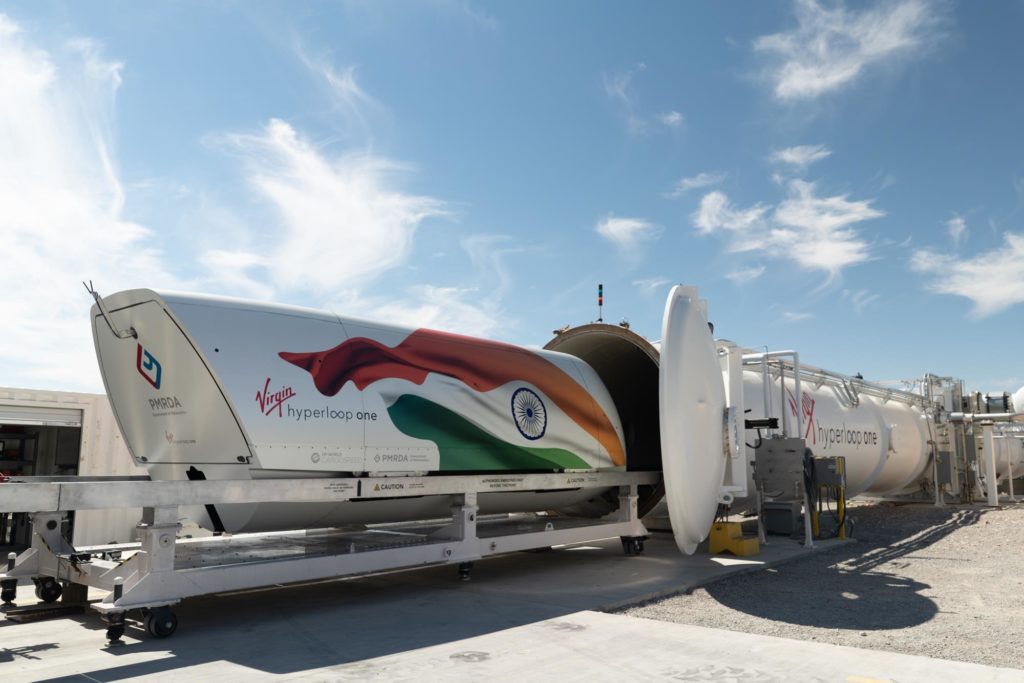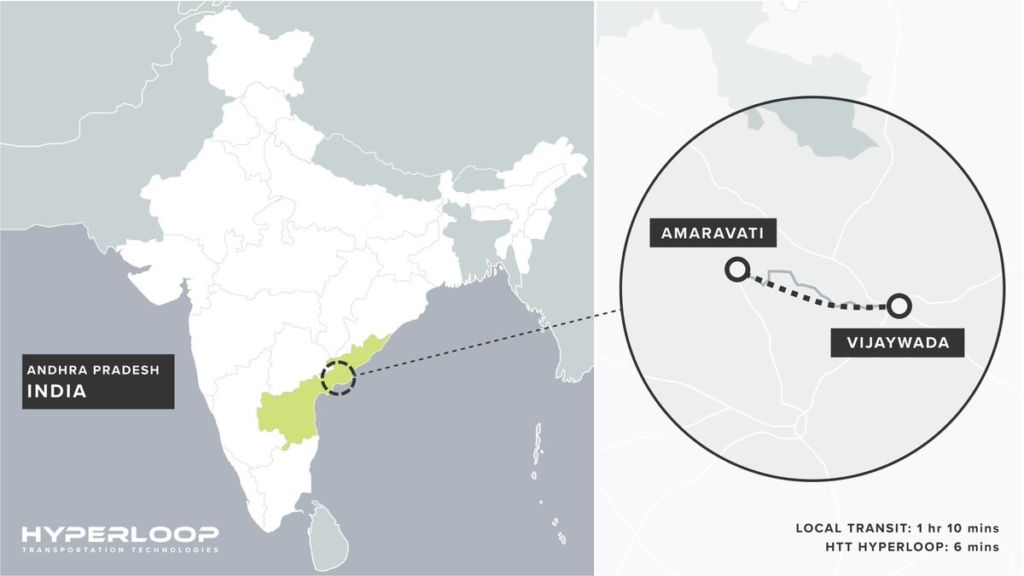
Hyperloop is the 5th mode of transportation, a ultra high-speed train that travels in a near-vacuum tube. The reduced air resistance allows the capsule inside the tube to reach speeds of more than 1000 kmph. Elon Musk, founder of SpaceX, proposed the idea of Hyperloop to the world in 2013 through whitepaper – Hyperloop Alpha.
The pod would initially launch using an electric motor before levitation takes place and the pod can glide at cruising speed in the low-pressure environment. The train pods would either float using magnetic levitation technology.
In India, Three state (Maharashtra, Karnataka and Andhra Pradesh) has shown interest in Hyperloop project for connecting its cities.

Maharashtra:
In Maharashtra, the state Maharashtra – one of the first proponents of hyperloop technology in the world – has deemed hyperloop a public infrastructure project, setting it up to be the first hyperloop project in the world. The MahaIDEA Committee has also earlier approved Virgin Hyperloop One-DP World (VHO-DPW) Consortium as the Original Project Proponent (OPP).
The hyperloop project will link central Pune to Mumbai in under 35 minutes, as opposed to the current 3.5+ hours by road.
A 15-km long test track for Mumbai-Pune Hyperloop project will be constructed near Pune. The test track for the hyperloop is proposed to be constructed between Kiwale and Urse on the Mumbai-Pune Expressway, sources said.

The project will generate hundreds of thousands of new high tech jobs, create over $36 billion USD in wider socio-economic benefits, and create new hyperloop component and manufacturing opportunities for Maharashtra to export to India and the rest of the world.
DP World (DPW), a global trade leader and a major ports and logistics operator in India, is set to invest $500 million USD in private capital to complete Phase One of the project, which will certify this new technology for passenger operations, establishing India as the epicenter of hyperloop innovation without using public funds.
This project will be executed in partnership between DP World – Virgin Hyperloop One consortia and the state government of Maharashtra, and further Foreign Direct Investment in billions of dollars is expected.
There are approximately 75 million passenger journeys between Mumbai and Pune annually – expected to skyrocket to 130 million by 2026.
In June 2018, Chief Minister of Maharashtra Mr. Devendra Fadnavis, and representatives from the State Government including the Pune Metropolitan Region Development Authority (PMRDA), visited Virgin Hyperloop One at their full-scale hyperloop test site in the Nevada Desert.

On February 18, 2018 — Virgin Hyperloop One announced that the Indian State of Maharashtra’s intent to build a hyperloop between Pune and Mumbai beginning with an operational demonstration track. The feasibility study will build upon the findings of the pre-feasibility study signed in November 2017 between Virgin Hyperloop One and the Pune Metropolitan Region Development Authority (PMRDA).
The hyperloop system will also have the potential for the rapid movement of palletized freight and light cargo between the Port of Mumbai and Pune, creating a robust backbone for on-demand deliveries, supply chains, and next-generation logistics.
The Pune-Mumbai route could result in USD $55 billion (INR 350,000 crores) in socio-economic benefits (time savings, emissions and accident reduction, operational cost savings, etc.) over 30 years of operation, according to an initial pre-feasibility study completed by Virgin Hyperloop One. The 100% electric, efficient hyperloop system will ease severe expressway congestion and could reduce greenhouse gas emissions by up to 150,000 tons annually.

The project will enter a procurement stage upon the successful completion of the feasibility study to determine the public-private partnership structure. Construction of the Pune-Mumbai hyperloop route would commence after procurement and will be completed in two phases, beginning with an operational demonstration track built between two points on the route.
The demonstration track serve as a platform for testing, certifying, and regulating the system for commercial operations. The second phase will target to complete construction of the full Pune-Mumbai route in five to seven years. Future projects could also extend the route to link central Pune with the New Pune International Airport and Jawaharlal Nehru Port in Mumbai with Pune’s industrial economic zones.
Andhra Pradesh:
Hyperloop transportation facility is likely to be introduced in Andhra Pradesh, connecting Vijayawada with upcoming state capital Amaravati. Currently, the state government is studying the feasibility of the project. If introduced, the 40 km distance between the two cities can be covered in just 6 minutes.
In September 2017, Hyperloop Transportation Technologies announced that they have signed a Memorandum of Understanding (MoU) with the Andhra Pradesh Economic Development Board (APEDB), to facilitate the development of HTT’s Hyperloop Transportation System.

The government had announced that it will study the feasibility of the project.
The proposed route for the Hyperloop is between the city centers of Vijayawada and Amaravati, potentially turning a trip of more than one hour into a 6 minute ride. The project will use a Public Private Partnership (PPP) model with funding primarily from private investors.
Karnataka:
In November 2017, Virgin Hyperloop One had announced its partnership with the Government of Karnataka to conduct its preliminary study to understand hyperloop’s feasibility and economic impact in the region. The US-based company signed a Memorandum of Understanding (MoU) with the Karnataka Urban Development Department (KUDD) aimed at identifying potential routes to improve mobility in the Benguluru metropolitan area and connect high growth cities such as Tumakuru, Hubli-Dharwad and Hosur within the state.
The company will be working with partners in the region and KUDD will help navigate the regulatory requirements and support the report with data.

As Karnataka is India’s hub for technology and innovation, it is certain to embrace a hyperloop transportation solution to support its growing manufacturing, technology, and scientific research industries. Some of the avenues where hyperloop could contribute are:
- Linking Bengaluru’s city center, IT hubs and industrial parks on the city’s periphery, by improving connections between fast-growing industrial hubs within the state such as Tumakuru, Hubli-Dharwad, Hosur, and Bengaluru
- Providing Bengaluru’s thriving tech and manufacturing employers with greater access to talent and enabling citizens to commute 10X farther in the same amount of time
- Improving air travel accessibility by connecting Bengaluru’s airport to the city center in minutes
- Creating freight corridors with surrounding cities, eventually extending to Chennai helping manufacturers to deliver freight to the closest port
All image credit: Hyperloop One

